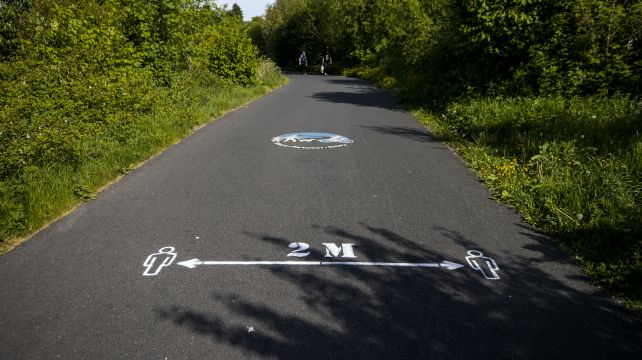The acting chief medical officer Dr Ronan Glynn and his Northern counterpart, Dr Michael McBride, have also made a specific appeal to teenagers and people in their 20s and 30s in Donegal and Londonderry to reduce their social contacts.
The two medical officers met on Friday as part of an effort to reduce travel between border counties.
It comes after the Irish Government announced that it is tightening its coronavirus restrictions in Co Donegal.
The Govt has decided to move Donegal to Level 3 under the Plan for Living with Covid-19 from midnight tomorrow following public health advice from NPHET. This is in response to rising Covid 19 cases in the county.
For more visit: https://t.co/z1gcv7Lo8z pic.twitter.com/GOD90Tf8Hs— Micheál Martin (@MichealMartinTD) September 24, 2020
Advertisement
In a joint statement, Dr Glynn and Dr McBride said: “Given the current number of new cases in Donegal and neighbouring areas of NI in Derry, Strabane and Fermanagh we would appeal to everyone to avoid all but necessary travel across the border.
“It is also recommended that employers on both sides of the border make every effort to facilitate employees to work from home in so far as is possible.
“We realise that for those living in border areas this will not be welcome news but we must prevent further spread of this virus and we can only do so by working together to protect each other.”
Donegal will move to risk level three of the Government’s plan to deal with Covid-19 following advice from the National Public Health Emergency Team (NPHET) as of midnight on Friday.
The restrictions will last for three weeks.
The chief medical officers said they were concerned about the significant proportion of cases in young people in Donegal and Derry, and asked teenagers and those in their 20s and 30s in particular to reduce their social contacts.
They also jointly called for everyone across the island to continue to follow public health advice to keep themselves and others safe.
They said close collaboration between the relevant authorities in Northern Ireland and Ireland would “continue and be strengthened” in the coming days to address the concerning trend in case numbers on both sides of the border, not alone in Donegal and Derry, but also in other areas along the border where the profile of the disease continues to evolve.
Donegal’s 14-day incidence rate is now higher than Dublin’s, with 148.2 positive cases per 100,000 population, and Dublin recording 144.5 positive cases per 100,000.
In neighbouring Derry and Strabane council area, the rate in the last seven days is 141.4 positive cases per 100,000 population – the highest in Northern Ireland.
Their statement comes as Taoiseach Micheál Martin urged Northern Ireland leaders to harmonise public health measures as the number of Covid-19 cases grows rapidly on both sides of the border.
The Fianna Fail leader spoke to First Minister Arlene Foster and Deputy First Minister Michelle O’Neill after the Irish Government’s announcement that Donegal would face stricter Covid-19 restrictions.
Mr Martin said on Friday that he did indicate to them that “on a practical level, it would make sense if we could harmonise as closely as possible respective public health measures”.
“The numbers on the other side of the border are high and worrying for authorities there.”
I was speaking to the CMO (Dr Glynn) over the week and places like Cork city has been going up in a straight line and that is a worry - 20 to 30 cases a day
Mr Martin said the respective medical officers were working to different systems so it “makes sense that there would be co-ordination, particularly in messaging and communications, and also in terms of testing and contact tracing”.
“That would be enhanced in terms of the interaction between GPs on both sides of the border.”
He said he is appealing to people’s “good sense and common will” to adhere to the updated public health measures in Co Donegal.
Mr Martin also warned that the NPHET could advise the Government to enforce local restrictions in cities including Cork, Limerick, Galway and Waterford.
The number of cases is continuing to rise in these areas, sparking concern among public health experts.







